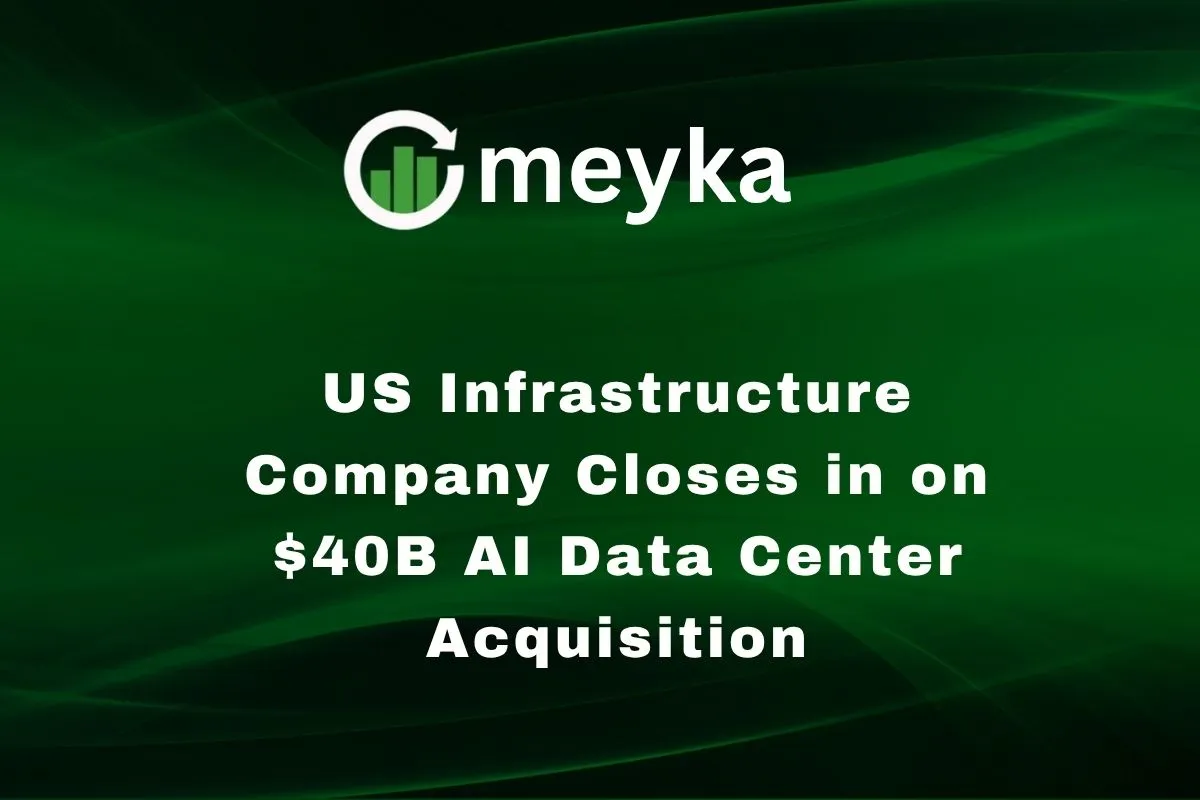US Infrastructure Company Closes in on $40B AI Data Center Acquisition
A U.S. infrastructure investment firm is on the brink of acquiring a major AI data center operator in a deal worth about $40 billion. The target is Aligned Data Centers, a Texas-based company focused on AI infrastructure. Global Infrastructure Partners (GIP), backed by BlackRock, is leading the negotiations. While the deal is not yet finalized, it may be announced soon.
We see this deal as a sign that “physical infrastructure” firms are racing to own digital assets. The rise of AI means data centers are no longer just storage hubs; they are the foundation of next-generation compute power.
Background of the Infrastructure Firm
GIP (Global Infrastructure Partners) is a large infrastructure investment firm with strong financial backing from BlackRock. GIP invests in energy, transport, utilities, and telecom assets. By going after Aligned, it is branching deeper into digital infrastructure.
Aligned Data Centers, in turn, has raised over $12 billion in funding to build and operate data centers optimized for AI workloads. The firm builds with high power, cooling, and network capacity to support heavy compute clusters.
This deal would mark a shift: infrastructure capital meeting high tech. It signals that owning racks of servers is now as strategic as owning pipelines or power lines.
Deal Details
The talks are reportedly in an advanced stage, and the valuation is about $40 billion. Abu Dhabi’s AI investment firm MGX (backed by Mubadala and G42) is also participating independently. The structure appears to be a full acquisition, but some equity partners may remain.
No formal public comment has come yet from GIP, Aligned, or Macquarie (which previously backed Aligned). The closing timeline is not confirmed, and regulatory review is expected.
Rise of AI Data Centers
An AI data center is different from a regular one. It must handle extremely high compute density, heavy cooling, power draw, and fast networking. AI models demand specialized infrastructure: GPUs, high-performance interconnects, and huge memory.
The surge in generative AI, large language models, and cloud AI services means that demand for this infrastructure is exploding. Spending on U.S. data centers has already reached a new high, about $40 billion in June 2025, up 30% from last year.
Major AI projects like OpenAI’s “Stargate” are also expanding. Under that initiative, five new U.S. AI data center sites were announced, bringing total planned capacity to nearly 7 gigawatts. In short, AI data centers are fast becoming central to the digital economy.
Strategic Motivations Behind the Deal
Why would GIP do this? Several reasons:
- Ownership of AI infrastructure: Having control over the physical backbone gives leverage and stable revenue.
- Meeting demand: AI workloads are hungry for capacity; owning more AI data centers means owning more “AI real estate.”
- Partnerships: GIP may partner with big tech firms needing AI compute.
- Long-term growth: As AI expands, the returns on data center investments may outpace traditional infrastructure.
We believe GIP is banking on the fact that AI computing will be a core utility in future economies, like power or telecom.
Financial & Market Implications
If the acquisition closes, GIP’s portfolio will tilt heavily toward digital assets. The firm may finance it through a mix of debt, equity, or bringing in co-investors. Markets have already started reacting: BlackRock’s stock has seen a boost on speculation of the move. Analysts will watch how GIP absorbs such a large asset and whether it can deliver growth that justifies the price.
A deal of this scale in technology infrastructure is rare. It may reset valuation benchmarks for AI infrastructure companies.
Regulatory & Operational Challenges
This deal is complex. It must clear merger reviews, especially concerning market concentration in AI infrastructure. Operationally, integrating data center networks, managing energy supply, cooling, and security across many locations is nontrivial. AI data centers are power hogs and require robust grid connections. Also, as we scale, data privacy, cybersecurity, and compliance with local regulations across states or countries become challenges to manage.
Sector Impact & Ripples
This acquisition could shift the balance in the AI infrastructure race. Other infrastructure funds may now dive in. Tech firms may prefer to lease capacity from firms like GP or negotiate joint ownership models. In energy, utilities will see more demand for stable power delivery. In real estate, location, cooling, and connectivity will matter even more. Overall, the sectors that support AI, from power grids to fiber backhaul to chip manufacturing, will feel the ripple.
Future Outlook & Trends
We expect AI infrastructure M&A to rise. More infrastructure capital will be deployed into data centers, fiber, and edge computing. Private equity and global funds will compete with tech firms for ownership of AI compute assets. Globally, there will be expansion outside the U.S., especially in Europe, Asia, and the Middle East.
Trends like modular AI data centers, sustainable cooling, and smart energy routing (e.g., tapping renewable power) may become standard. Research also points toward using AI itself to operate data centers (digital twins, PhyAI) for efficiency. We see a future where AI compute is treated like a basic utility, and the owners of this infrastructure may be among the most strategic players in 21st-century tech.
Conclusion
This near-$40 billion acquisition signals a major turning point. It shows that physical infrastructure players are stepping into the AI arena. The deal, if closed, could reshape power, tech, and data center sectors. It raises big questions: Who will control AI capacity? How will regulation respond? We are witnessing a new frontier in infrastructure, the frontier of AI Data Center ownership. And in this race, capital and technology are converging in ways we haven’t fully seen yet.
FAQS:
AI data centers are owned by big tech companies and investment firms. Groups like Microsoft, Google, Amazon, Meta, and private equity investors build and manage most of these advanced facilities worldwide.
Tech giants and infrastructure developers lead this space. Companies like Amazon Web Services, Google Cloud, Microsoft Azure, NVIDIA partners, and firms like Aligned and CoreWeave build AI-ready data centers.
Data centers earn money by renting space, power, and computing capacity to businesses. They also charge for cloud services, storage, security, maintenance, and AI processing support.
Disclaimer:
This content is for informational purposes only and is not financial advice. Always conduct your research.






